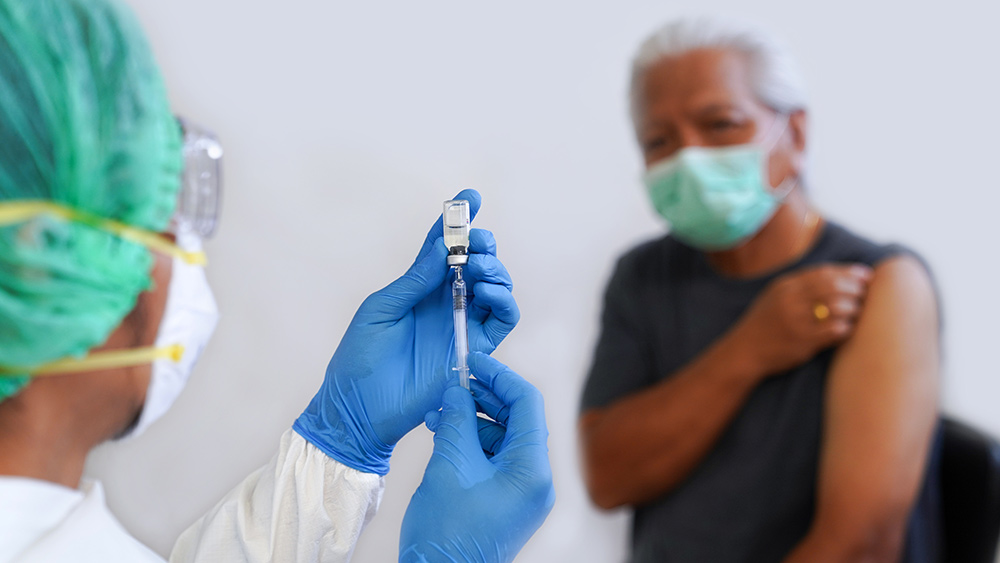Here’s another health benefit of flaxseed: Improved gum health
03/26/2021 / By Evangelyn Rodriguez

Periodontitis, also known as gum disease, is a common but preventable disease caused by a bacterial infection. This infection damages the soft tissue of the gums and, if not treated promptly, can cause teeth to fall out. Practicing good oral hygiene is the best way to prevent periodontitis, although there are several risk factors — such as smoking, gingivitis, obesity, diabetes and vitamin C deficiency, among others — to watch out for as well.
Today, dentists treat periodontitis by first removing dental plaque and calculus (tartar) then prescribing medicated mouthwashes or oral antibiotics. However, commonly used antibiotics for periodontal diseases are known to cause numerous side effects, including rashes, diarrhea, gastrointestinal intolerance, nausea and an unpleasant metallic taste. Because of these concerns, many people are starting to veer away from these medications.
The good new is, there are many natural antibiotics that can help with bacterial infections. In a recent study, researchers in India reported the efficacy of flaxseed (Linum usitatissimum) in preventing the growth of common periodontal pathogens in vitro. Widely cultivated as food and a source of fiber, flaxseed has been labeled as a superfood because of its abundance of essential nutrients and outstanding health benefits.
The researchers discussed the antimicrobial properties of flaxseed in an article published in the International Journal of Herbal Medicine.
More than just a nutrient source: Flaxseed is also a potent antimicrobial
According to research, the use of antibiotics is beneficial in the management of periodontitis. However, antibiotic resistance has now become a major global issue, and it is believed to have stemmed from the misuse of antibiotics. Many researchers now see herbal interventions as therapeutic strategies that deserve more research and attention.

Flaxseed, a popular superfood rich in omega-3 fatty acids, has demonstrated potent antimicrobial and anti-biofilm activities in multiple studies. To further explore these useful properties, the researchers conducted an in vitro study to assess the antimicrobial activity of flaxseed against periodontal pathogens.
They prepared an ethanolic extract from flaxseed powder and determined its minimum inhibitory concentration (MIC) and minimum bactericidal concentration (MBC) against three oral pathogens, namely, Porphyromonas gingivalis, Aggregatibacter actinomycetemcomitans and Tannerella forsythia.
P. gingivalis is an invasive and evasive bacterium that has been described as a “keystone” biofilm species. It is heavily involved in the pathogenesis of periodontitis. A. actinomycetemcomitans is an opportunistic pathogen associated with aggressive forms of periodontitis. Like P. gingivalis, this bacterium is well-equipped to escape host immune response.
T. forsythia, meanwhile, has been strongly implicated in the onset of periodontitis. According to studies, overweight or obese individuals have an overgrowth of this particular bacterium. Hence, it is more commonly associated with periodontal diseases in overweight patients than in people with normal weights.
The researchers reported that flaxseed extract exhibited bacteriostatic activity (inhibits growth) against all three pathogens. At 100 microliters (uL)/milliliter (mL), the extract exerted bactericidal effects against P. gingivalis, meaning it was able to kill the bacterium.
Based on these findings, the researchers concluded that flaxseed can be used as a natural adjunct to periodontal therapy because of its bactericidal effects against P. gingivalis.
Other health benefits of flaxseed
Flaxseed refers to the small edible seeds of the flax plant. It is rich in essential nutrients, as well as healthful fats, fiber and antioxidants. One tablespoon of this incredible superfood can provide you with 1.3 grams of protein, 1.9 grams of fiber, 1,597 mg of heart-healthy omega-3s and an assortment of vitamins and minerals, such as vitamins B1, B6 and B9 and calcium, magnesium, iron, phosphorus and potassium. Because of its impressive nutrient profile, flaxseed offers a variety of health benefits, such as: (Related: Flaxseed is one of the world’s most important medicinal foods.)
- Reduced inflammation
- Reduced cancer risk
- Improved digestive health (e.g., regular bowel movements, lower risk of irritable bowel syndrome)
- Lower blood cholesterol levels
- Lower blood pressure
- Reduced appetite
- Better blood sugar control
Flaxseed is a versatile food and ingredient, so you won’t find it hard to incorporate this superfood into your daily diet. To enjoy better heart, metabolic, digestive and oral health, boost your diet with nutritious flaxseed and flaxseed oil.
Sources include:
Submit a correction >>
Tagged Under:
alternative medicine, disease treatment, flaxseed, food cures, food is medicine, food science, functional food, gum health, natural antibiotics, natural cures, natural medicine, oral health, periodontitis, remedies, research
This article may contain statements that reflect the opinion of the author





















